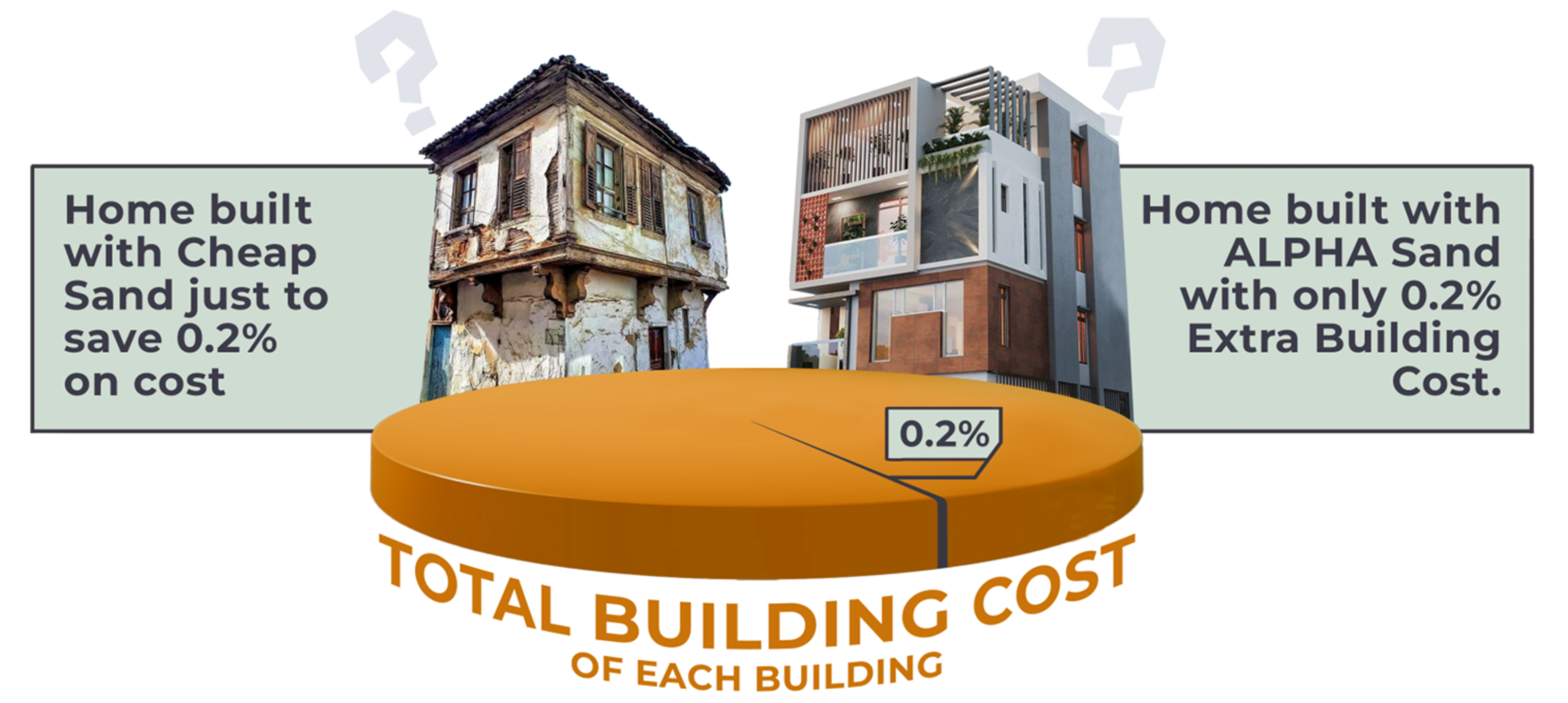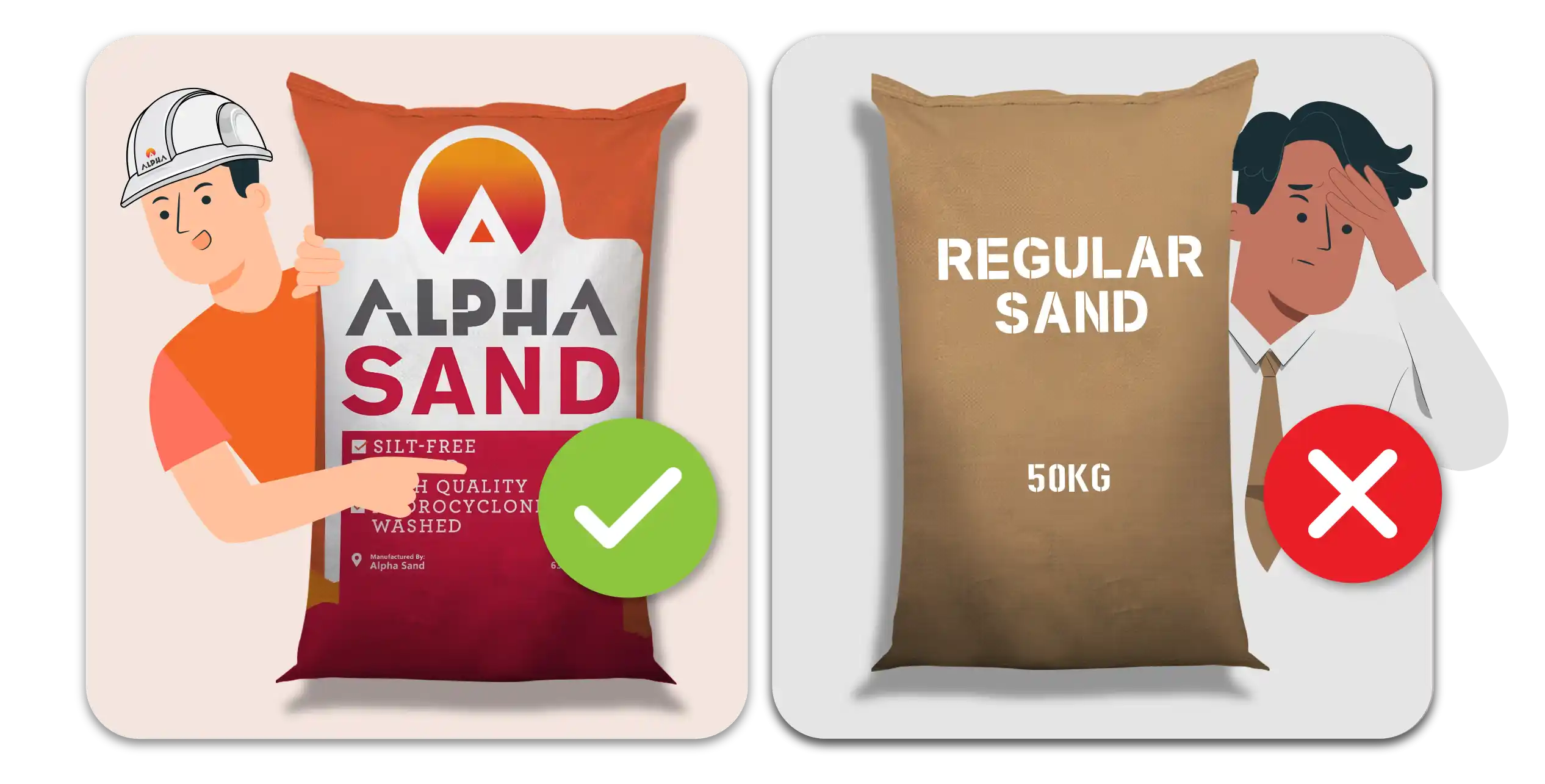
Are you focusing only on Quality steel and cement and going for low-quality sand? This will lead to potential problems like cracks, less loadbearing capacity, and less longevity and durability in your house.
In this write-up, we will look into why you must invest in good-quality sand and understand its impact on the stability, strength, and longevity of your home or building.
Importance of Sand in Construction
-
Any building or construction foundation acts as its primary means of support. To ensure stability and avoid settlement, it equally transfers the weight of the entire structure to the subsoil. Gravity, wind, and seismic activity are just a few of the forces that must be able to endure a solid foundation.
-
A solid and long-lasting foundation is built largely with sand. It serves as a solid bedding material, giving the foundation a flat surface to rest on. The possibility of differential settlement is reduced by correct sand application and compaction. Sand also assists in minimizing the impacts of soil contraction and expansion caused by moisture fluctuations, lowering the risk of foundation deterioration.
The Challenges in Choosing Construction Materials:

- One of the main challenges in construction is the inclination to compromise on the quality of sand because of its lower cost than other raw materials. In the process of cost-cutting, certain builders and contractors may choose cheaper sand options without considering the long-term consequences. However, making decisions based solely on price might negatively affect the construction project's overall structural integrity and durability.
-
Using low-quality sand can pose significant risks and consequences to a construction project. Low-quality sand often needs more requirements for a solid foundation as it might contain impurities and uneven particle size, which leads to poor compaction and settlement issues over time. Low-quality sand also increases the likelihood of structural problems such as cracks, uneven settlement, and compromised load-bearing capacity, potentially resulting in costly repairs or structural failures.
Advantages of Investing in High-Quality Sand:

-
Investing in good high-quality sand, such as Alpha C sand, brings notable advantages regarding compressive and flexural strengths. This means the sand can withstand significant weight and pressure without deformation. With the help of superior-quality sand, builders can ensure their construction's longevity and structural integrity, especially in areas that require heavy loads or have highly demanding demographic conditions.
-
High-quality sand is important in improving construction projects' stability and durability. It gives a solid and stable base for the foundation by lessening the risk of uneven settling of the building over time. High-quality sand's proper compaction and uniformity contribute to a stable and consistent foundation, ensuring the building can withstand environmental stresses.
-
Using high-quality sand lessens the risk of settlement and structural issues like cracks, water seepage, etc. Low-quality sand might contain excessive fines or uneven particle size, causing inconsistent settling and structural instability. Conversely, superior-quality sand like Alpha C sand is carefully processed to meet the standards, ensuring uniformity and proper particle size distribution. This reduces the probability of settlement problems, holding the formation of cracks, uneven surfaces, and load-bearing capacity. By investing in good-quality sand, builders can reduce settlement risks and avoid structural failures in building down the line.
Overcoming the price perception Barrier:

- The initial cost of good-quality sand may be higher than cheap or low-quality sand, so it is crucial to consider long-term cost-effectiveness. Quality sand, like Alpha C sand, offers higher performance and durability. By investing in good quality sands, builders can save the cost of future maintenance.
-
Using cheap sand to cut costs can initially lead to a false sense of savings. But the long-term consequences can be far more expensive. Sometimes lower quality sands leads to structural issues like cracks on walls, chipping plaster, etc, which require costly repairs or complete reconstruction. Investing in superior-quality sand ensures the financial burden of repairs and rebuilding projects.
-
Investing in superior quality sand is important as it ensures a strong foundation, reliable structure, and reduced settlement risk. One should consider the long-term value and potential financial consequences of compromising on good quality sand; builders can make informed decisions by prioritizing their construction projects' overall success and longevity.
Conclusion:

Investing in high-quality sand for construction is essential to ensure a sturdy and long-lasting structure. It gives a strong foundation, lowers the possibility of settling problems, and increases stability. Choosing high-quality sand pays off in the long run, saving money on maintenance and repairs despite the initial expense.